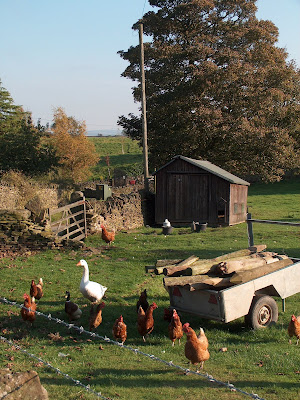

"O God, I could be bounded in a nut shell and count myself a king of infinite space, were it not that I have bad dreams." - Hamlet Act II scene ii








Stanage Edge, or simply Stanage (from "stone edge") is a gritstone escarpment in the English Peak District, famous as a location for climbing. The northern part of the edge forms the border between the High Peak of Derbyshire and Sheffield in South Yorkshire. Its highest point is High Neb at 458 metres (1,503 ft) above sea level. Areas of Stanage were quarried in the past to produce grindstones, and some can still be seen on the hillside—carved, but never removed.
 And here's an ancient cairn - some thousands of years old - on Bamford Moor - looking west to Stanage:-
And here's an ancient cairn - some thousands of years old - on Bamford Moor - looking west to Stanage:-



 A marvellous and thriving real ale pub at Nether Green - "The Rising Sun":-
A marvellous and thriving real ale pub at Nether Green - "The Rising Sun":- Sheffield's foremost Irish pub, "The Dog and Partridge" on Trippet Lane:-
Sheffield's foremost Irish pub, "The Dog and Partridge" on Trippet Lane:- CAMRA 's regular national pub of the year, "The Kelham Island Tavern":-
CAMRA 's regular national pub of the year, "The Kelham Island Tavern":-


A Widower
We lived within these walls -
Janet , our babies
And me.
I can still hear echoes -
The ringing of the phone,
Those late for school mornings,
Birthdays and bonfires,
Laughter and tears -
We lived it all.
That’s her favourite perfume.
That’s her side of the wardrobe.
That’s a letter from outpatients.
That’s the bed
Where we made
Our children in the dead of night
Like breathing air.
That’s Sally’s room.
That’s Paul and Jeffrey’s.
This is the fridge
Yes it’s almost bare.
This is her hairbrush
With strands of her hair.
And that, that was Janet’s chair -
But I can never sit there
I sit by the phone.
It makes me feel
Somehow less alone.
And sometimes they ring
The children I mean
Bulletins from their new lives
And places they have been
Later with silence re-released
I stare at our mantelpiece
That day in April, 1974
Standing in confetti
By the very same church door.

During the conversation, "Nyanza Roberts" replied: "by town, do you mean top end of holderness road?
"That's bout as far anyone in east Hull goes.
"No wonder everyone is thick....inbreeding must damage brain development."
"Debbie Johnson" then said: "You're really on one today mrs... !! Xx."
"Nyanza Roberts" replied: "Haha, I'm actually in a good mood.
"If anyone reading this is offended, then get a grip."
Another teacher, "Jane Johnson", then said: "Massive queue of Westcott year 5/6 kids in poundland! x".
Copies of the conversation were pinned to lampposts and trees in the school's neighbourhood. The banality of what was said and how it was said makes me shudder. Professional people are not saints and given the pressures of work in the modern world, everybody needs to let off steam from time to time but Facebook is not the place to do it.

Parents reading letters of apology from the school
There have been plenty of examples of serious work problems even sackings caused by unwise Facebook comments. Those presumably well-educated teachers at Westcott Primary should have been wise enough not to let their guard down so publicly. However, what is more reprehensible is the sense that when all is said and done these young teachers look down on their pupils and the community they serve, forgetting that without these people they wouldn't be in receipt of comfortable teachers' salaries.
From now on, how can they hold their heads up high at parents meetings or even in front of their classes? Idiots!









Ode to Beau
Quietly, so quietly you gorge upon our grass.
Silently, so silently the daylight hours pass.
I woke to hear you just past dawn
Sheepishly munching on our lawn.
Like tiny waves your fleece it curls
Tight and springy with lanolin whirls
Your voice is deep and reassuring
Your wise brown eyes are so alluring.
Oh Beau , I’ve spent my whole life counting sheep
Jumping over gates to send me to sleep.
I never thought in my wildest dreams,
My fantasies and hair-brained schemes
That I’d ever receive a genuine sheep -
A real life Merino for me to keep!
Folk wonder why I called you Beau -
I shake my head 'cos I don't know.

